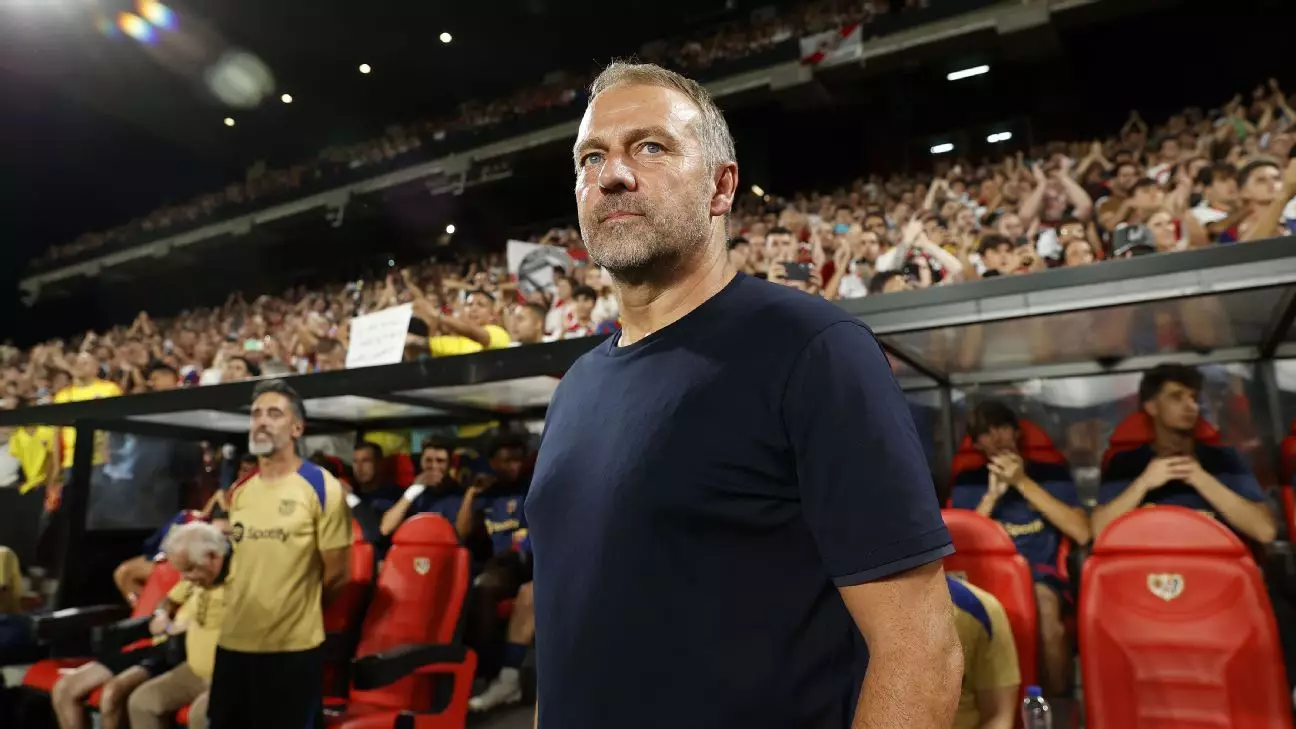Barcelona’s recent defeat to Las Palmas highlighted a growing chasm between the team’s defensive and offensive units, a sentiment underscored by coach Hansi Flick. The 2-1 loss not only extended the club’s winless streak in LaLiga to three matches but also threw a wrench into the celebration of their 125th anniversary. This disconnect has been a persistent issue that, if unresolved, could spell trouble for a team that began the season with promises of resurgence.
Flick’s observations point to a fundamental issue: a lack of synergy between the defense and attack that undermines the team’s effectiveness on the pitch. Raphinha’s goal briefly brought hope, but it was quickly overshadowed by poor defensive decisions that allowed Las Palmas to capitalize. Flick’s post-match comments reflect a recognition of this pattern, noting that mistakes were made not just at the back but in the attacking phases as well. This systemic failure requires more than just tactical adjustments; it demands a deep reflection on teamwork and player mentality.
The defeat against Las Palmas serves as a case study in tactical inefficiency affecting performance. Barcelona dominated possession, boasting 70% with 27 attempts on goal. Yet, the quantitative dominance did not translate into qualitative success. The inability to convert chances points to a crucial issue in efficiency—a direct departure from the clinical finishing that characterized their early-season success.
Flick’s assertion that “when you play as a team… we can play and win against every team” emphasizes the need for collective responsibility. The disconnect observed on the field—where individual brilliance fails to coalesce into a cohesive unit—is symptomatic of deeper issues. Relying heavily on individual talent can lead to inefficiencies and a lack of cohesion that prevents the team from executing strategic plans effectively.
Confidence in Crisis: The Psychological Component
As Barcelona stumbles through this challenging phase, Flick insists that the players maintain their belief in their capabilities. This confidence, while essential, must be balanced with a critical examination of performance. Each game that slips away from their grasp can erode self-esteem, making it imperative for the coaching staff to bolster psychological resilience.
Flick’s emphasis on confidence suggests an awareness that morale can significantly impact on-field performance. However, confidence without accountability can result in complacency. Addressing mental blocks—where players hesitate to execute game plans under pressure—becomes paramount. A focus on psychological preparation should accompany tactical training to ensure that players not only believe in their abilities but also feel empowered to implement strategies effectively on match day.
With crucial matches against Mallorca, Real Betis, and Borussia Dortmund on the horizon, the urgency for Barcelona to recalibrate is palpable. Flick’s comments signal a determination to address the current issues head-on. The return of key players like Dani Olmo, Marc Casadó, and potentially Lamine Yamal provides a glimmer of hope for reinvigorating team dynamics.
Nevertheless, the path forward requires a concerted effort to restore connections between players. Team-building exercises, tactical drills, and perhaps a reassessment of roles within the squad may be necessary to reforge bonds that have frayed during this recent slump. The ability to rediscover the rhythm that earlier defined their play is critical.
The recent matches serve not just as bumps in the road but as teachable moments for Barcelona. The club must reflect on the broader strategic implications of their current form. Every loss elucidates weaknesses that can be exploited by opponents; thus, understanding and addressing them is crucial for the long-term success of the team.
Flick’s belief in the potential of his players is a strong foundation on which to rebuild confidence. Yet, underpinning that faith must be a clear strategy for improving both individual performances and collective unity. If Barcelona can harness the lessons learned from this challenging chapter, they may yet turn their fortunes around and reignite the passion and brilliance that the club is known for.

Leave a Reply